|
February 26, 2021 - No. 11
Vaccines for All Campaign
Uphold the Rights of Migrant and Undocumented Residents
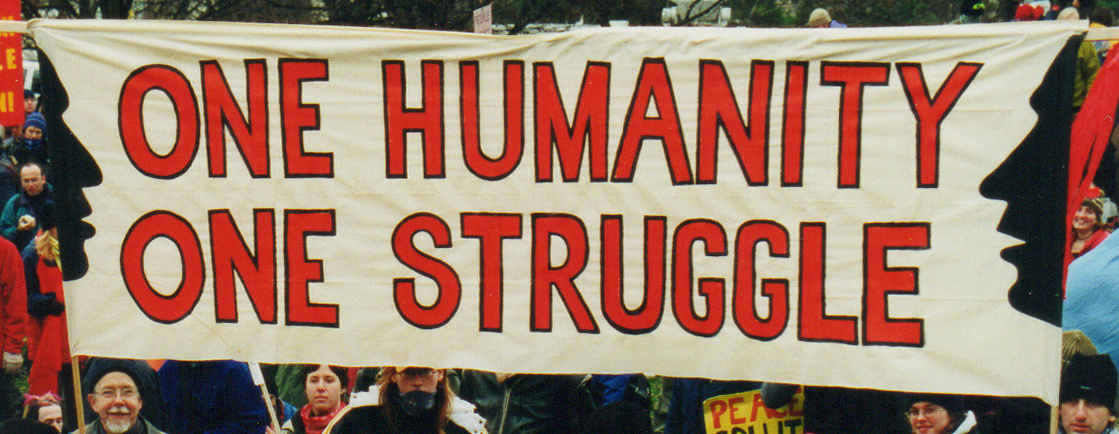
• Vaccines for All Campaign Launched
• Migrants Rights Advocates Denounce Inadequate Ontario Farm Inspections
• Migrant Rights Network Organizes We Feed You Campaign on Canadian Agriculture Day
Health and Safety for All
• Support the Demand for Paid Sick Leave for All Workers
Vaccines for All Campaign
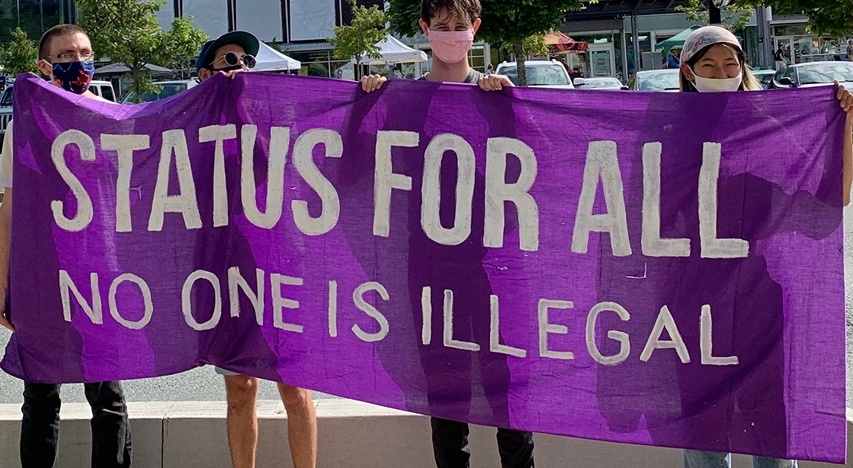
Anxiety and a great deal of acrimony have been created by
governments, cartel parties and media across the country over
vaccinations protocols and who gets vaccinated when. Because Canada's
economy is not based on self-reliance and caters to global
pharmaceutical oligopolies to receive vaccines to deal with the COVID-19
pandemic,
Canada is way behind other countries in protecting its people. And,
within this, the situation in which migrant workers, including
undocumented workers, are facing discrimination and exclusion from
vaccination programs is beyond unacceptable. Because of their
designation by a racist state as people who can be mistreated and
abused, thousands of
people in Canada working in essential jobs but living in fear of
deportation, are unable to access basic health care including
vaccinations. They are even unable to walk safely in the streets for
fear of being stopped by the police and deported.
 The
Migrant Rights Network issued a statement on February 24 on this matter
entitled "Migrant Rights and Health Experts call for Safe and Dignified
Access Without Fear to COVID-19 Vaccines for Migrant and Undocumented
Residents." The
Migrant Rights Network issued a statement on February 24 on this matter
entitled "Migrant Rights and Health Experts call for Safe and Dignified
Access Without Fear to COVID-19 Vaccines for Migrant and Undocumented
Residents."
The statement points out that one in 23 people in Canada don't have
permanent resident status, including many workers in healthcare,
cleaning, construction, delivery and agriculture, and that many
migrants in Canada don't have health cards because they are
undocumented or their work or study permits have expired due to
government
processing delays during the pandemic.
On the one hand workers are threatened by employers that they must
be vaccinated and on the other hand workers live with the threat that
if their personal information is shared with federal immigration
enforcement they will be detained and deported.
It is unconscionable that in a crisis that impacts everyone racist
division of the people into categories designed to permit
discrimination and denial of basic human rights to some is still
presented by the elite and their governments as modern and humane. The
only solution is the immediate recognition of the legitimacy of all
human beings in
Canada, providing vaccinations to all without question, and the
granting of permanent resident status to all migrant workers and
students who are here and want to stay.
Excerpts of the statement follow:
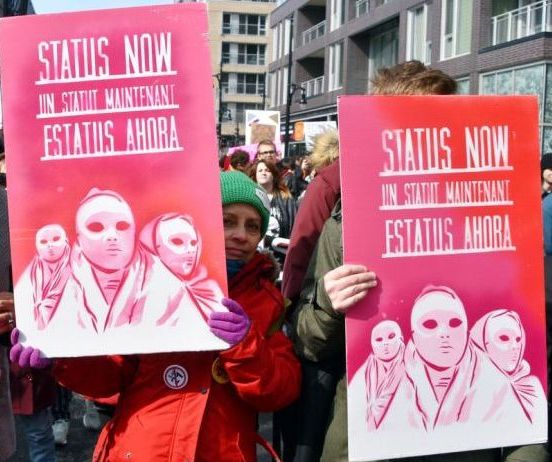 "The
Migrant Rights Network along with leading doctors, health policy
experts, and labour leaders, is calling for immediate action to ensure
that all migrant and undocumented residents of Canada are able to be
vaccinated. A letter signed by 270 organizations outlines specific
measures that must be implemented in order to make government
assurances about universal vaccine access a reality. For the COVID
vaccine to be accessible to migrants in a safe and non-coercive manner,
the following must be implemented: "The
Migrant Rights Network along with leading doctors, health policy
experts, and labour leaders, is calling for immediate action to ensure
that all migrant and undocumented residents of Canada are able to be
vaccinated. A letter signed by 270 organizations outlines specific
measures that must be implemented in order to make government
assurances about universal vaccine access a reality. For the COVID
vaccine to be accessible to migrants in a safe and non-coercive manner,
the following must be implemented:
- Vaccination must be provided free of charge;
- Vaccination must not require a health card or health coverage;
- Names, addresses or other identifying information should not be
required for vaccination because migrant and undocumented people are
fearful of sharing this information;
- No ID information should be shared with federal immigration enforcement;
- Vaccine must be accessible (available in rural communities, to
those who don't speak English or French, don't have access to a
computer, telephone, etc);
- COVID-19 vaccination should not be coercive or mandatory. To
protect against this, anti-reprisal protections and permanent resident
status must be ensured for migrants that speak up about workplace
issues;
- Vaccine providers must be trained so that they don't turn away
people who don't have health coverage or are fearful of sharing their
ID;
- Anti-racist public education is necessary to address vaccine
hesitancy. Migrants have well-founded reasons to distrust medical
systems because of histories of violence and coercion;
- Universal healthcare for all; and
- Full and permanent immigration status for all."

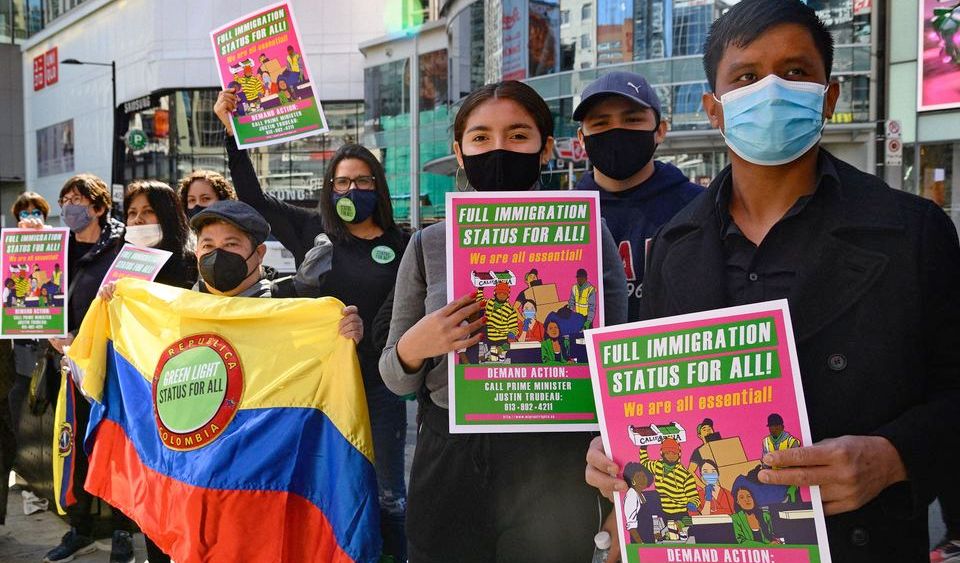
The Migrant Rights Network (MRN) held a press conference on
February 24 to launch its Vaccines For All national campaign. The aim
of the campaign is to "ensure full access to the COVID-19 vaccine to
all migrants regardless of immigration status" in a safe and equitable
way.
The press conference featured five speakers. Lily, a frontline care
worker from the Caribbean shared her experience of coming to Canada to
work as a live-in caregiver, leaving her three children behind. Her
work permit expired before she was able to find stable work to fulfill
the requirements for permanent status. She pointed out that she,
like others of her peers without status, is unable to get vaccinated
because she has no health card. She stated that undocumented workers
live in constant fear and cannot access basic rights to healthcare,
housing, social services and legal rights, and now to the vaccine. She
highlighted that undocumented workers are part of Canadian society,
contribute
to it and must be protected.
Dr. Danyaal Raza, a member of Canadian Doctors for Medicare and a
physician at St. Michael's Hospital in downtown Toronto called on
governments to take practical action to ensure that all people without
status are vaccinated as a matter of right and part of the efforts to
bring the pandemic under control. He also stated that his organization
supports the fight for all migrants to have permanent status to end
their criminalization and enable them to live with dignity. Dr. Raza
said he also opposed the concept of "earned status" such as the Quebec
government has implemented to "reward" some migrants and refugees for doing
"essential" frontline work, pointing out that status and healthcare are
a matter of basic rights.
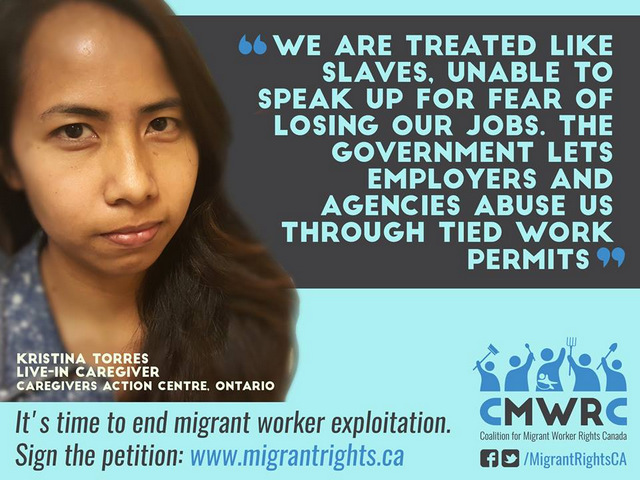 Pauline Worsfold, a nurse, and Chair of the Canadian Health Coalition and Secretary Treasurer
of the Canadian
Federation of Nurses Unions said that her organizations support the
Vaccines for All campaign. She noted that all migrant workers have to
be part of the vaccine rollout and that the principles of the Canada
Health Act of universal,
accessible and comprehensive health care must be upheld so that
everyone can get the vaccine regardless of their status. Pauline Worsfold, a nurse, and Chair of the Canadian Health Coalition and Secretary Treasurer
of the Canadian
Federation of Nurses Unions said that her organizations support the
Vaccines for All campaign. She noted that all migrant workers have to
be part of the vaccine rollout and that the principles of the Canada
Health Act of universal,
accessible and comprehensive health care must be upheld so that
everyone can get the vaccine regardless of their status.
Byron Cruz of Sanctuary Health in Vancouver and the BC Federation of
Labour highlighted the role of migrant workers on the front lines doing
"essential" work in Canada, many of whom have to wait for three months
after arriving in Canada to access health care services. Thousands of
migrant workers have become infected and three migrant
agricultural workers have died in Ontario as a consequence of not
having protection and medical assistance in a timely fashion, he noted.
He highlighted that the BC Federation of Labour has been working with
the provincial government to find ways and means to vaccinate all
migrant workers including those without status.
Samira, a young worker and a member of Solidarity Across Borders,
has been living in Montreal without status for eight years. After
working a number of low-paying jobs she was forced to quit in order to
look after her mother. She said that she was afraid of leaving her
dwelling now for fear of being questioned by police and the curfew now
imposed in Quebec has made life even more stressful. She called for an
end to the criminalization of migrant workers and for status for all.
On behalf of MRN, Syed Hussan, the moderator of the press
conference, called on governments at all levels to work with health
authorities and migrant rights organizations to take immediate action
to ensure that all migrant workers including those without status have
access to free COVID-19 vaccines and underscored the importance of
fighting
for full and equal status for all migrant workers. He called on
everyone to join the campaign, to sign the MRN's Vaccines for All
petition here, and to get others involved.


Media reports that in the first two weeks of a recent provincial
inspection blitz of farms in southwestern Ontario one in five farms
were
issued non-compliance orders for COVID-19 safety measures. Ontario
Ministry of Labour inspectors had conducted 31 field visits in the
western region, most in Windsor and Essex County, the area
which had the highest concentration of COVID-19 cases in 2020.
The federal government is responsible for the living conditions of
migrant farm workers and provincial governments have responsibility for
overseeing working conditions on farms. Both the federal and provincial
governments follow the imperialist outlook that workers are
commodities, not people with rights. Since the beginning of the
Seasonal Agricultural Worker Program (SAWP) in the late sixties, the
government has brought thousands of Caribbean and Mexican workers to
Canada every year to meet the needs of agri-business. These workers
live in conditions of servitude, tied to one employer and denied the
right to collectively organize in defence of their rights, under
threat of being returned to their home country if they speak out. Last
year 20,500 temporary foreign agricultural workers came to Ontario.
More than 1,780 contracted COVID-19 and three died.
The inspections did not include the
bunkhouses where workers live, only working areas. Six of the 31
locations inspected were issued COVID-19 non-compliance orders, most
related to physical distancing and mask protocols.
 Justice
4 Migrant Workers (J4MW) denounced the failure of the government to
take any measures to change the living and working conditions
of migrant farm workers that created the conditions for the spread of
COVID-19 amongst workers on Ontario farms and said that it makes no
sense to have an inspection blitz prior to the
workers' arrival. The J4MW spokesperson, Chris Ramsaroop, also pointed
out that employers are given advance notice of inspections and that the
presence of translators from the Mexican consulate at the inspections
does nothing to support the workers. The government says that the
translators are there to "ensure workers are heard during the
inspections," but J4MW points out that this actually increases the
likelihood of reprisal against workers who speak out, as Mexican
government officials have the power to deny approval to individuals who
apply to Canada's temporary foreign worker program. Justice
4 Migrant Workers (J4MW) denounced the failure of the government to
take any measures to change the living and working conditions
of migrant farm workers that created the conditions for the spread of
COVID-19 amongst workers on Ontario farms and said that it makes no
sense to have an inspection blitz prior to the
workers' arrival. The J4MW spokesperson, Chris Ramsaroop, also pointed
out that employers are given advance notice of inspections and that the
presence of translators from the Mexican consulate at the inspections
does nothing to support the workers. The government says that the
translators are there to "ensure workers are heard during the
inspections," but J4MW points out that this actually increases the
likelihood of reprisal against workers who speak out, as Mexican
government officials have the power to deny approval to individuals who
apply to Canada's temporary foreign worker program.
Justice 4 Migrant Workers has been calling for the province to enact
immediate paid sick leave, expanded health and safety regulations for
the agriculture industry, guarantee protection for workers who speak
out about unsafe conditions, and include worker housing under the Ontario Health and Safety Act. Workers often live in crowded conditions which make it difficult to control the spread of infectious diseases.
Above all, the need is for permanent resident status for all
workers, a recognition that migrant workers are part of the Canadian
working class and a guarantee of their right to safe and healthy
working and living conditions when they are in Canada and a path to
citizenship for workers and their families.

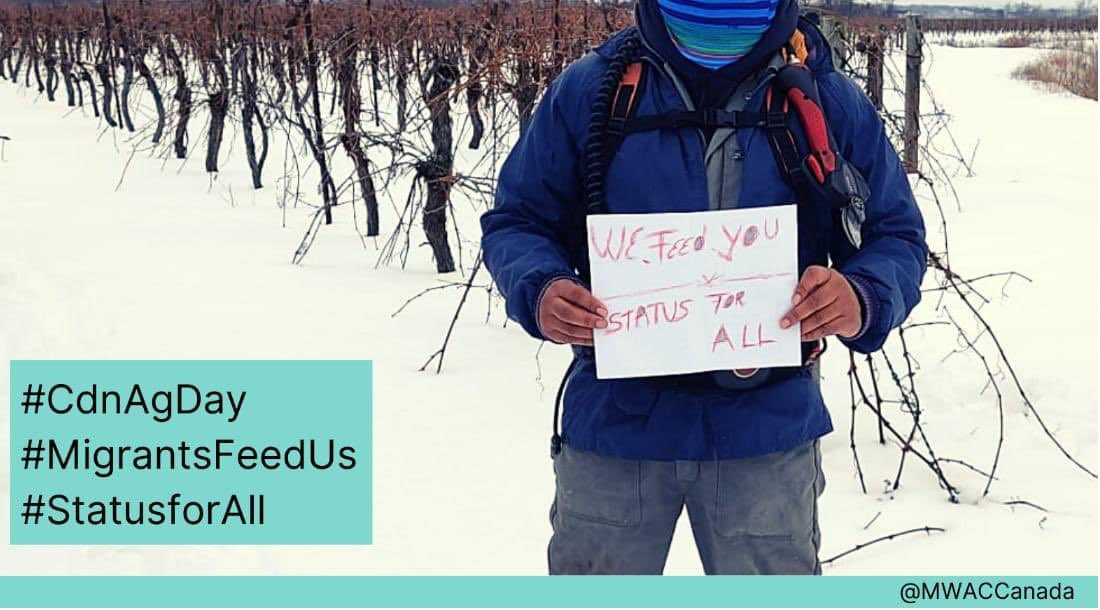
One of the images posted on twitter by Migrant Rights Network for Canadian Agriculture Day.
Every
year since 2016 on February 23 the Canadian agri-business monopolies
and Canadian federal and provincial governments organize Canadian
Agriculture Day to
celebrate "Canadian agriculture and food and the people who produce it."
This year the Migrant Workers' Network organized an online campaign
to highlight the indispensable work that migrant farmworkers do to
plant, tend and harvest food. The aim of the campaign was to highlight
the demand for Canada to recognize these workers' right to status. Many
have been coming to Canada for decades, tied to one employer and
separated from their home communities and families for long periods.
Migrant
Rights Network called on everyone to use the official hash tag
#CdnAgDay to popularize the slogan: We Feed You and post photographs to
"reveal the truth about who feeds us and join in migrant farm workers'
fight for equal rights and justice." Migrant workers and their allies
from Canada, Mexico and the Caribbean responded, posting photographs
highlighting the struggle for migrant workers' rights, including
permanent status and to highlight the important work that they do in
Canada's farms.

Health and Safety for All
Across Canada, unions, workers, public health officials, medical
associations and many other organizations and individuals are demanding
urgent action to provide paid sick leave to all workers. As public
health authorities warn of the continuing dangers of COVID-19 and the
possibility of a third wave and call for vigilance to curb the
spread, the need for paid sick leave has become even
more urgent. The Decent Work and Health Network, a network of health
providers based in Ontario who advocate for better health by addressing
employment conditions, assesses that 58 per cent of workers in Canada --
and over 70 per cent of workers making less than $25,000 -- have no
access whatsoever to paid sick days. It recommends that all provincial,
territorial, and federal jurisdictions must update their employment
standards to require employers to provide at least seven days of paid
emergency leave on a permanent basis and require employers to
provide an additional 14 days of paid emergency leave
during
public health emergencies.
 There
have been and continue to be outbreaks in workplaces, including many
food processing plants, across
the country. Since the outset of the pandemic public health officials
have stressed the importance of workers not reporting to work if they
are sick, even with mild symptoms. Compliance with this directive is
extremely difficult for
workers in predominantly low paid non-union jobs, but impacts all
workers without paid sick leave and workers who may have used up their
sick leave and would receive no pay should they stay home with
COVID-19 symptoms. There
have been and continue to be outbreaks in workplaces, including many
food processing plants, across
the country. Since the outset of the pandemic public health officials
have stressed the importance of workers not reporting to work if they
are sick, even with mild symptoms. Compliance with this directive is
extremely difficult for
workers in predominantly low paid non-union jobs, but impacts all
workers without paid sick leave and workers who may have used up their
sick leave and would receive no pay should they stay home with
COVID-19 symptoms.
The ruling elite demand compliance with public health orders by
individual workers and even, in the case of outbreaks in workplaces,
go so far as to blame the workers and threaten them with fines if
their life circumstances -- overcrowded housing, holding two or more
jobs to make ends meet, carpooling -- put them in danger, but
take
no responsibility for protecting society by ensuring that
workers have the wherewithal to comply. While blaming the workers for,
among other things, not staying home when they are sick, employers
offer rewards for improved production, including bonuses for "perfect
attendance." Government officials, including public health care
officials, say the onus is on individuals to follow public health
orders but do nothing to force employers to make that possible, nor
provide the financial and social supports that workers need.
The federal government introduced the Canada Recovery Sickness
Benefit (CRSB) in October 2020 when the Canada Emergency Response
Benefit (CERB) ended. The benefit is available to workers who stay home
with COVID-19 symptoms, but not unless they lose
over 50 per cent of their work in a week. It pays $450 after taxes per week for up to
four weeks, which is less than a full-time minimum-wage job does in
most provinces. It doesn't provide immediate accessible paid sick
leave. Workers have to apply for the benefit, like Employment
Insurance, and can wait weeks to be paid. The CRSB also excludes some
essential workers, such as migrant workers, who may not have the social
insurance number required to access it. This is not a benefit that
meets the needs of workers who depend on a regular paycheque to provide
the day to day necessities of life and cannot afford to miss work if it
results in an interruption of earnings.
London
West NDP MPP
Peggy Sattler presented Bill 239, the Stay Home If You Are
Sick Act, 2020
to the Ontario legislature on December 8 and on February 16
requested unanimous
consent of the legislature for the bill, which was denied. The
Bill was then debated
at second reading in the legislature on February 25. Bill 239
would amend the Employment
Standards Act to provide for seven days of paid leave and
three days of
unpaid leave in a calendar year as "personal emergency leave,"
replacing the current provisions dealing with sick leave, family
responsibility
leave and bereavement leave. It would amend the section of the
Act which
provides for unpaid leave related to declared emergencies and
infectious
diseases emergencies, making the first 14 days of leave in a
calendar year paid
leave. Members of the Provincial Parliament are scheduled to
vote on Bill 239
on March 1. Supporters of the bill are asking everyone to call and send
e-mails to
Conservative MPPs and to the Premier and Cabinet Ministers to
demand that the
legislation be passed.
Premier Doug Ford contemptuously dismissed the growing demand for
legislative action to guarantee that workers can take time off when
they are sick without loss of income by saying that it would be a
"waste of tax-payers' money" and that it would duplicate the federal CRSB.
He says that the federal CRSB is enough and that Ontario’s
adoption of legislation mandating paid sick leave would be "double
dipping" for taxpayers. The reality of life for workers who live
paycheque to paycheque is of no concern to Premier Ford.
Canada has a modern socialized economy in which the collective work
of workers across all industries and the service sector produce
everything. Sick leave without loss of income belongs to workers by
right and governments have a social responsibility to guarantee that
right through legislation and enforcement.

(To access articles individually click on the black headline.)
PDF
PREVIOUS
ISSUES | HOME
Website: www.cpcml.ca
Email: office@cpcml.ca
|

